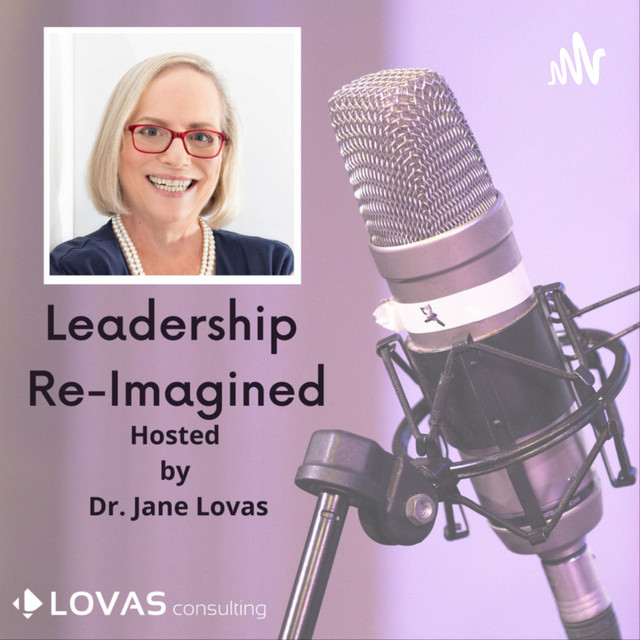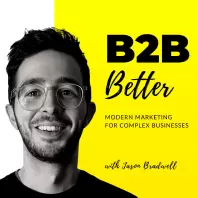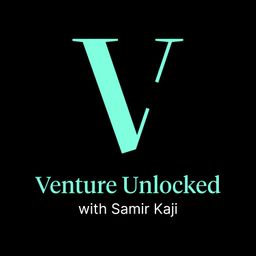
Venture Unlocked: The playbook for venture capital managers

Basic Member
Ownership Verification Center
And, schedule a video verification call with us. Don't worry it takes a few minutes only :)
Latest Episodes
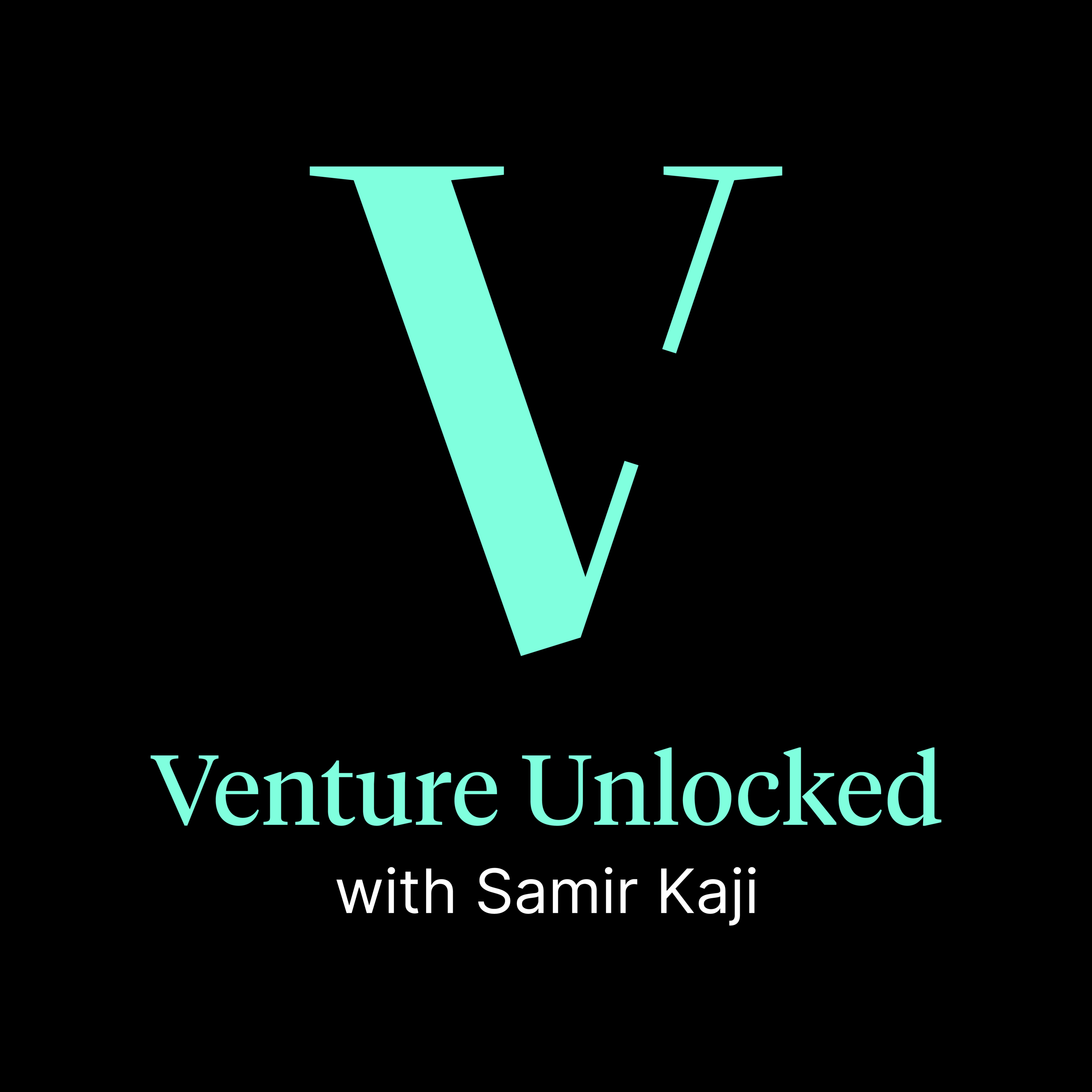
Betting on Founders Who Build the Real World
Follow me @samirkaji for my thoughts on the venture market, with a focus on the continued evolution of the VC landscape.
Welcome back to another episode of Venture Unlocked, the podcast that takes you behind the scenes of the business of venture capital.
In this episode, I sit down with Lior Susan from Eclipse to explore his journey from building companies in the physical world to founding and scaling a unique venture firm. We discuss the importance of high-conviction investing, assembling elite teams from operator backgrounds, and staying adaptable in a rapidly shifting market shaped by technology and AI. Lior shares lessons on discipline, honesty, and the realities of venture investing, offering actionable insights for anyone interested in building resilient companies or understanding what it takes to succeed in today’s venture landscape.
Thanks for listening to another episode of Venture Unlocked. We hope you enjoyed our conversation with Lior. If you’d like to get Venture Unlocked content straight to your inbox, go to ventureunlocked.substack.com and sign up, or go to Apple Podcasts or Spotify and subscribe. Thanks again for listening.
About Lior Susan
Lior Susan is the founder and managing partner of Eclipse, a venture capital firm focused on backing entrepreneurs who are building companies to transform physical industries. He began his career as a co-founder of Intucell, a software-defined networking startup that was acquired by Cisco in 2012. After that, he led the hardware investment platform Lab IX at Flextronics, deploying capital across energy storage, additive manufacturing, robotics, and wireless infrastructure. In 2015, Lior launched Eclipse to invest in startups transforming critical industries like manufacturing, logistics, supply chain, transportation, energy, and on. He draws on experience as an operator, investor, and former Israeli special forces serviceman to support founders tackling complex, real-world problems.
Eclipse is a firm headquartered in Palo Alto (with a New York presence) that partners with entrepreneurs building category-defining companies in physical industries. The firm builds and invests in companies at all stages, combining hardware, software, and systems to modernize “bits and atoms.” Since its founding in 2015, Eclipse has built and backed over 100 companies and helped accelerate startups like Bedrock, VulcanForms, True Anomaly, and Cerebras — companies driving innovation in construction, digital manufacturing infrastructure, defense capabilities, and AI infrastructure.
During the conversation, we discussed:
* Lior’s Career Path and Founding Eclipse (3:38)
* Reflecting on the Fund’s Origins and Initial Fundraising (6:46)
* Adjusting Firm Size and Strategy as Opportunities Grow (9:49)
* High-Conviction, High-Ownership Investment Approach (12:45)
* Decision-Making Process and Team Dynamics (14:57)
* Patterns Among Founders of Large Companies (17:27)
* The Evolution of Eclipse’s Value Proposition (20:23)
* Operator-to-Investor Transitions and Internal Training (24:49)
* Market Shifts and Macro Changes in Venture Capital (27:07)
* Exit Challenges, IPOs, and Long-Term Private Markets (30:27)
* Alignment Between LPs and Managers Around Exits (33:44)
* Lior’s Investment Lessons and Reflections on Power Law (35:17)
* Thoughts on Deglobalization and Future Predictions (36:32)
I’d love to know what you took away from this conversation with Lior. Follow me @SamirKaji and give me your insights and questions with the hashtag #ventureunlocked. If you’d like to be considered as a guest or have someone you’d like to hear from (GP or LP), drop me a direct message on X.
This is a public episode. If you would like to discuss this with other subscribers or get access to bonus episodes, visit ventureunlocked.substack.com

Unpacking "A Crisis Moment In Seed"
Follow me @samirkaji for my thoughts on the venture market, with a focus on the continued evolution of the VC landscape.
Welcome back to another episode of Venture Unlocked, the podcast that takes you behind the scenes of the business of venture capital.
Today, I sat down with Rob Go, Co-Founder and Partner at NextView, to discuss the shift in seed-stage investing and what seed funds need to consider to remain viable. The conversation was sparked by a series of Posts Rob wrote, the first of which was called a Crisis Moment in Seed. We spent a lot of time talking about what inspired the post and how seed managers should adapt to the shifted market. For anyone investing at seed, this is a must listen as Rob shared so many insightful views.
Thanks for listening to another episode of Venture Unlocked. We hope you enjoyed our conversation with Rob. If you’d like to get Venture Unlocked content straight to your inbox, go to ventureunlocked.substack.com and sign up, or go to Apple Podcasts or Spotify and subscribe. Thanks again for listening
About Rob Go
Rob Go is the co-founder and partner of NextView Ventures, a thematic seed-stage venture capital firm focused on investing in founders solving meaningful problems for everyday people. Before launching NextView, Rob was a venture capitalist at Spark Capital, where he focused on the intersection of media, technology, and entertainment.
Earlier in his career, Rob led the “Finding” business unit at eBay, where he helped design and launch over 20 products that transformed the platform’s search and merchandising experience. He also worked in strategy consulting at The Parthenon Group, focusing on consumer and retail industries, and held product management roles at Fidelity Investments and BzzAgent.
Rob holds a B.S. in Economics from Duke University and an MBA from Harvard Business School. Beyond venture, he’s a founding member of Highrock Church in Brookline, MA, and a dedicated husband and father who values family and faith as deeply as entrepreneurship.
NextView Ventures is an early-stage venture capital firm founded in 2010, with offices in New York, Boston, and San Francisco. They focus on seed-stage investments, typically ranging from around $250K to $4M, in companies building consumer, fintech, digital health, and B2B SaaS solutions that reshape what they call the everyday economy The firm has backed a number of notable companies, including ThredUp, Grove Collaborative, WHOOP, and TripleLift, all of which have achieved significant exits or growth milestones. Their hands-on, founder-first approach and thematic focus have helped them build a strong track record in seed investing.
During the conversation, we discussed:
* The Venture Landscape’s Evolution Since 2011 (3:27)
* The Entry of Accelerators Like YC and Mega Funds (6:21)
* The Role of YC’s Offer Structure in the Seed Market (9:14)
* Mega Funds and the Influence of the Power Law (12:21)
* AI’s Market Impact and Opportunities for Seed Investors (15:18)
* Defensibility and Differentiation in AI Applications (18:17)
* The Importance of Distinct Strategies for Seed Funds (21:37)
* Super Compounder Versus Classic Venture Approaches (24:26)
* Adjusting Capital Allocation for Non-Consensus Companies (27:26)
* The Role of Optionality in Navigating Downstream Capital (30:35)
* NextView’s Tactical Shift Toward Data and AI Tools (33:27)
* Lessons on Discipline, Dogmatism, and Missed Opportunities (36:22)
I’d love to know what you took away from this conversation with Rob. Follow me @SamirKaji and give me your insights and questions with the hashtag #ventureunlocked. If you’d like to be considered as a guest or have someone you’d like to hear from (GP or LP), drop me a direct message on X.
This is a public episode. If you would like to discuss this with other subscribers or get access to bonus episodes, visit ventureunlocked.substack.com

Platform Shifts, AI, and the Future of Consumer Investing
Follow me @samirkaji for my thoughts on the venture market, with a focus on the continued evolution of the VC landscape.
Welcome back to another episode of Venture Unlocked, the podcast that takes you behind the scenes of the business of venture capital.
In this episode, I had the pleasure of speaking with Mercedes Bent about her fascinating journey from a tech-driven upbringing to becoming a leading venture capitalist. We discussed how her unique background informs her investment philosophy and the importance of originality and non-consensus thinking in today’s VC landscape. Our conversation also covered the challenges and opportunities in consumer technology, the transformative impact of AI, and strategies for portfolio construction. One of my key takeaways was the critical role of intuition in identifying exceptional founders, as well as the value of building compounding networks and staying ahead of platform shifts. It was an insightful discussion that offered practical lessons for anyone interested in the future of venture capital. We hope you enjoy the conversation.
Thanks for listening to another episode of Venture Unlocked. We hope you enjoyed our conversation with Mercedes. If you’d like to get Venture Unlocked content straight to your inbox, go to ventureunlocked.substack.com and sign up, or go to Apple Podcasts or Spotify and subscribe. Thanks again for listening
About Mercedes Bent
Mercedes Bent is a Venture Partner at Lightspeed Venture Partners and Co-Founder of venture firm Premise. At Lightspeed, she focused on early-stage investments in consumer, fintech, multicultural markets, and Latin America. She began her career at the Federal Reserve and Goldman Sachs before moving into the education technology sector with General Assembly. At General Assembly, she helped expand one of the company’s key product lines from $2M to $100M in revenue over four years. She joined Lightspeed in 2019 after developing a strong investment perspective in areas such as edtech, VR, and multicultural consumer products. At Lightspeed, she has invested in and worked with companies including Stori, Honeylove, Forage, Magic Eden, Outschool, and Flink. She has also been recognized in industry publications for her contributions to venture capital and efforts to broaden access to entrepreneurship.
Lightspeed Venture Partners, founded in 2000, is a global venture capital firm managing over $25 billion in assets with offices across the U.S., Europe, Israel, India, and Southeast Asia. The firm invests from seed to growth stage across enterprise, consumer, fintech, healthcare, and emerging tech. Over the years, Lightspeed has backed more than 500 companies, including Snap, MuleSoft, Affirm, Carta, and Anthropic, and has been part of notable exits like AppDynamics and Nest. With a strong record of helping founders scale and succeed, Lightspeed is recognized as a leading partner for building category-defining companies.
During the conversation, we discussed:
* Mercedes’s Background, Upbringing, and Early Career (1:45)
* How Background Informed Firm Values/Culture (4:19)
* The Gap in Consumer Technology Investing & Identifying Founders (8:40)
* Non-Consensus Investing in Early Stage VC (10:01)
* Startup Mentality and KPIs in Fund Management (15:06)
* Sourcing vs. Winning Seed Deals – What Matters? (16:19)
* Seed Manager vs. Large Fund Business Models (21:21)
* Gifted TVPI vs. Earned TVPI, Portfolio Philosophy (26:22)
* Consumer Sector’s VC Downturn & New Tech Cycles (32:21)
* The AI Consumer Technology Wave & Opportunity (35:33)
* Identifying Product-Market Pull and Early Leading Indicators (37:08)
* Shifts in Distribution Channels in AI (40:09)
* Future-casting, Platform Shifts, and AI Companions (43:50)
* Lessons from Years in VC & Trusting Intuition (44:27)
* Final Thoughts and Takeaways (47:46)
I’d love to know what you took away from this conversation with Mercedes. Follow me @SamirKaji and give me your insights and questions with the hashtag #venture unlocked. If you’d like to be considered as a guest or have someone you’d like to hear from (GP or LP), drop me a direct message on X.
This is a public episode. If you would like to discuss this with other subscribers or get access to bonus episodes, visit ventureunlocked.substack.com
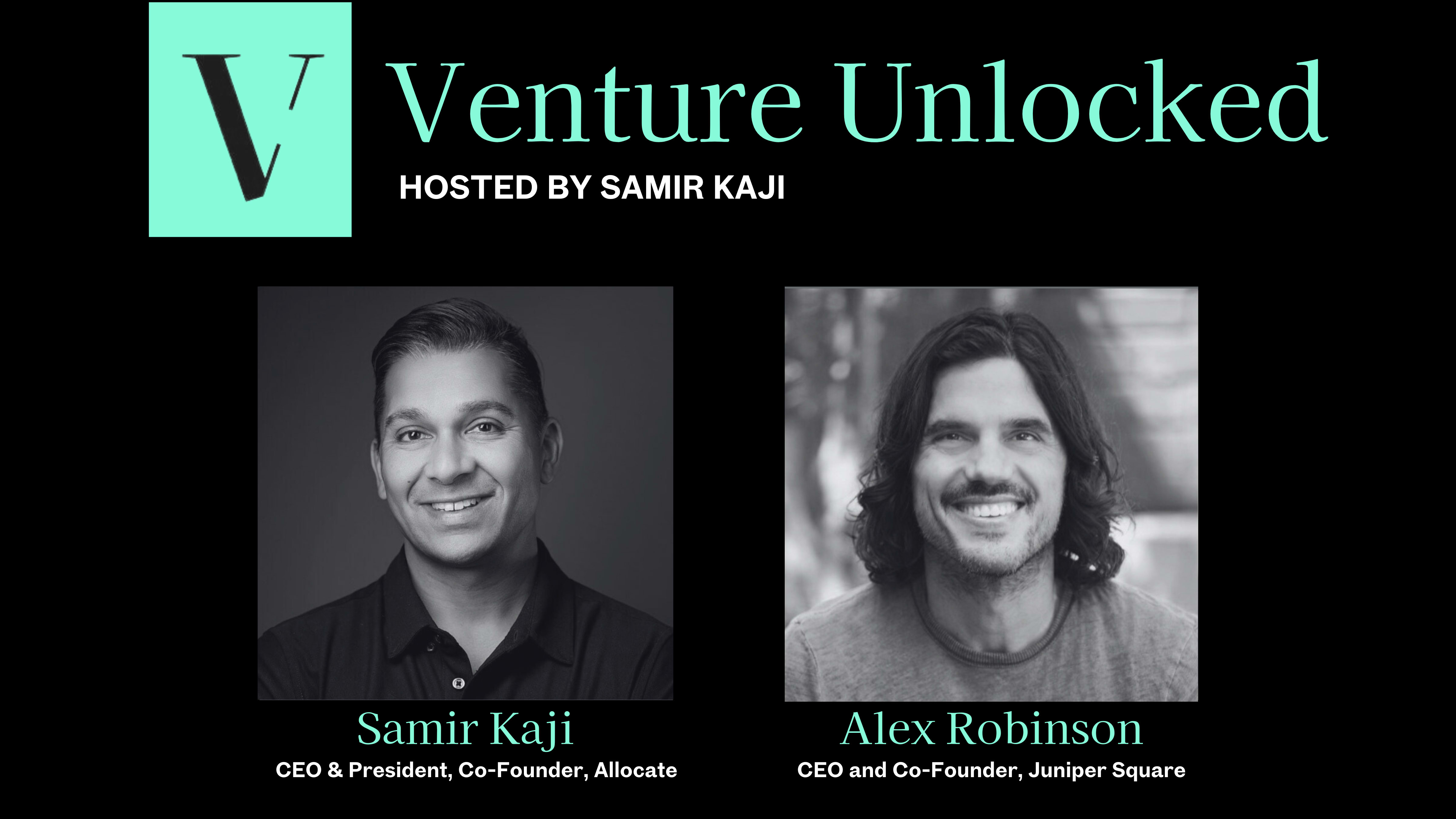
The GP of 2030: AI, Automation, and the Future of Capital Formation
Follow me @samirkaji for my thoughts on the venture market, with a focus on the continued evolution of the VC landscape.
Welcome back to another episode of Venture Unlocked, the podcast that takes you behind the scenes of the business of venture capital.
In this episode, I had the pleasure of speaking with Alex Robinson, CEO and Co-Founder of Juniper Square. We talked about the evolution of private markets and the transformative role of technology and AI in fund administration. We also discussed the inefficiencies that inspired Juniper Square’s founding, the challenges of scaling operations for both institutional and individual investors, and the ongoing push for greater transparency between GPs and LPs. Alex shared insights on how AI is set to revolutionize knowledge work in the industry, streamline workflows, and enhance the investor experience. Key takeaways include the critical importance of embracing technology to drive efficiency, the growing impact of AI on fund management, and the need for adaptability as the private markets continue to evolve.
Thanks for listening to another episode of Venture Unlocked. We hope you enjoyed our conversation with Alex. If you’d like to get Venture Unlocked content straight to your inbox, go to ventureunlocked.substack.com and sign up, or go to Apple Podcasts or Spotify and subscribe. Thanks again for listening
Bio of Guest:
Alex Robinson is the CEO and Co-Founder of Juniper Square, a leading investment management software platform transforming private markets. With a background in engineering and business, Alex previously held product and leadership roles at top technology firms, including Microsoft and Boston Consulting Group. His own experience as a limited partner inspired the creation of Juniper Square in 2014, aiming to modernize and simplify the private investment process. Under his leadership, the company has grown to serve over 2,500 GPs and over 600,000 LPs, managing tens of thousands of investment funds. Alex is recognized as a driving force behind digitizing private markets and expanding investor access through innovation and transparency.
Juniper Square is a leading investment management platform designed to streamline operations for private equity, real estate, and venture capital firms. The platform helps General Partners (GPs) manage fundraising, investor reporting, and fund administration through intuitive, data-rich software. Since its founding in 2014, Juniper Square has become a trusted partner to over 2,500 GPs and supports more than 600,000 Limited Partners (LPs) across more than 40,000 investment funds. By replacing outdated systems with modern, transparent tools, Juniper Square is transforming how private markets operate and expanding access for investors worldwide.
Timestamps:
In this episode, we discuss:
* Founding Motivation for Juniper Square (2:00)
* Early Focus on Real Estate and LP Trends (6:13)
* Complexity and Lack of Standardization in Private Markets (11:40)
* Impact of Technology on LP Experience (15:34)
* Transparency Evolution in Private Markets (19:15)
* Differences Across Asset Classes and Regulation (23:15)
* Strategic Decisions and Market Surprises (26:09)
* Bundling and the Future of Wealth Channel Access (30:43)
* AI’s Impact on Private Markets and Fund Operations (33:44)
* The GP of 2030: AI and Capital Formation (37:49)
* AI and Labor Market Disintermediation (42:07)
* Future Vision and Company Outlook (44:07)
* Final Thoughts and Takeaways (47:07)
I’d love to know what you took away from this conversation with Alex. Follow me @SamirKaji and give me your insights and questions with the hashtag #venture unlocked. If you’d like to be considered as a guest or have someone you’d like to hear from (GP or LP), drop me a direct message on X.
This is a public episode. If you would like to discuss this with other subscribers or get access to bonus episodes, visit ventureunlocked.substack.com
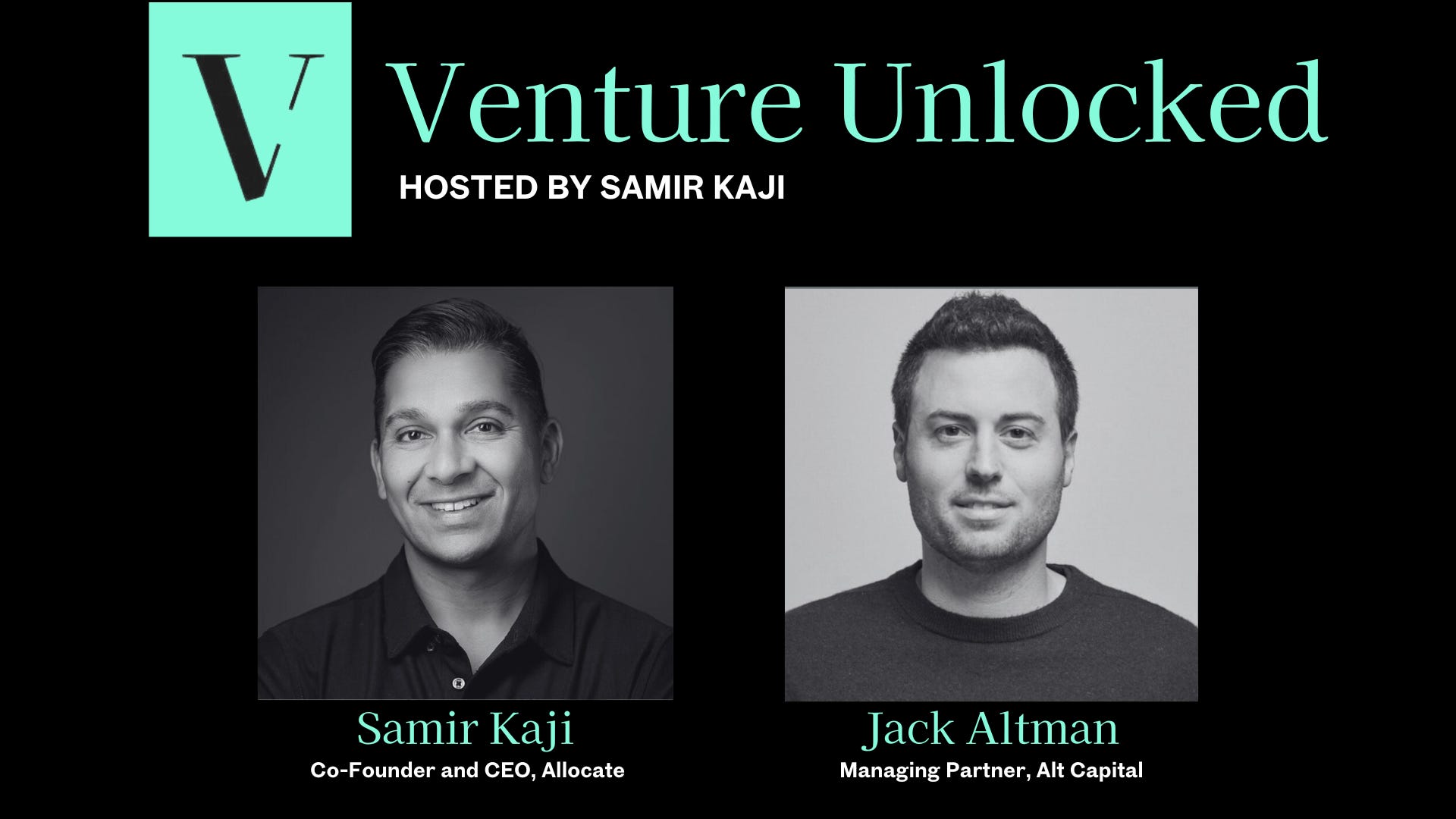
Jack Altman on the transition going from building a Unicorn with Lattice to starting a venture firm
Follow me @samirkaji for my thoughts on the venture market, with a focus on the continued evolution of the VC landscape.
Welcome back to another episode of Venture Unlocked, the podcast that takes you behind the scenes of the business of venture capital.
In this episode, I sit down with Jack Altman, Managing Partner at Alt Capital. We unpack Jack’s journey from Lattice CEO to venture capitalist. We dive deep into the nuances of venture investing, exploring how operators transition into investors, the importance of founder relationships, and the critical elements of successful early-stage investing. Jack shares candid insights about evaluating talent, providing tough feedback, and navigating the current AI technology landscape. His most compelling advice centers on the importance of backing founders you truly believe in, regardless of market fluctuations. As we discuss everything from fund strategies to valuation challenges, the conversation reveals the complex art of venture capital – a world where relationships, intuition, and long-term vision matter more than short-term metrics.
Thanks for listening to another episode of Venture Unlocked. We hope you enjoyed our conversation with Jack. If you’d like to get Venture Unlocked content straight to your inbox, go to ventureunlocked.substack.com and sign up, or go to Apple Podcasts or Spotify and subscribe. Thanks again for listening
About Jack:
Jack Altman is the founder and Managing Partner of Alt Capital, a $150 million early-stage venture fund he launched in February 2024 that has invested in Antares, David AI, Legora, and Owner, among others. Jack is also an investor in companies like Figma, Rippling, Writer, and Vanta. Prior to his career in investing, Jack co‑founded and led Lattice, an HR and people-performance platform that grew to serve thousands of global companies and reached a $3 billion valuation before he transitioned into his role as Executive Chairman. With a background that includes roles in corporate finance and business development, Jack honed his startup expertise at Teespring and Hydrazine Capital before building Lattice from the ground up. Now at Alt Capital, Jack combines his founder-to-investor experience to back innovators in B2B software and hard tech. He's launched initiatives like the Generate accelerator, offering expert mentorship and resources to AI-driven startups—underscoring his commitment to pragmatic, conviction-led investing.
Alt Capital is an early-stage venture firm focused on backing exceptional founders across industries, predominantly B2B software and hard tech. With a $150 million debut fund launched in 2024, Alt Capital takes a founder-first, conviction-driven approach to investing—leveraging Founder Jack Altman’s experience scaling Lattice into a $3B company to support startups through their earliest and most pivotal stages. Alt Capital prioritizes long-term partnership, practical guidance, and high-conviction bets over volume-based investing. In a short time, Alt Capital has already positioned itself as a go-to firm for ambitious founders building the next wave of category-defining companies.
In this episode, we discuss:
* Jack’s Transition: Operator to Investor (1:47)
* Early Surprises in Running a Venture Firm (4:05)
* Types of Venture Capitalists and Motivations (6:37)
* Brutal Honesty vs. Founder Friendliness (9:51)
* Earning the Right to Give Advice (13:19)
* What Makes a Good Venture Capitalist (18:22)
* Evaluating Founders: Motivations and Outlier Traits (21:20)
* Measuring Success in Venture: Feedback Loops and KPIs (26:53)
* Big vs. Small Venture Firms: Different Models (29:47)
* Venture as Different Financial Products (32:35)
* AI, Market Size, and Valuation Inflation (34:13)
* Underwriting and Fund Size Strategy (37:45)
* Biggest Lesson Learned in Venture (43:19)
* Final Thoughts and Takeaways (44:55)
I’d love to know what you took away from this conversation with Jack. Follow me @SamirKaji and give me your insights and questions with the hashtag #ventureunlocked. If you’d like to be considered as a guest or have someone you’d like to hear from (GP or LP), drop me a direct message on X.
This is a public episode. If you would like to discuss this with other subscribers or get access to bonus episodes, visit ventureunlocked.substack.com

How to win in seed stage investing today
Follow me @samirkaji for my thoughts on the venture market, with a focus on the continued evolution of the VC landscape.
Welcome back to another episode of Venture Unlocked, the podcast that takes you behind the scenes of the business of venture capital.
In today’s episode, we are joined by Nakul Mandan, who is the founding partner of seed-stage firm Audacious Ventures.
Having known Nakul since the early days of his journey in starting the firm in 2020, I was excited to dive deep into his unique path, from his roots in India to venture capital, working at firms such as Battery and Lightspeed before starting his own firm. As venture capital has evolved and grown, the stakes of being a successful early-stage manager have increased dramatically.
In our chat, we discussed how managers should think about navigating competitive markets and how a proper system around sourcing, picking, winning, and building a brand through delivering for founders requires a machine-like approach. Audacious has created its own system, which is unlike most firms, providing a nice juxtaposition of more traditional models. This was a fun and candid deep dive into seed stage investing, and we hope you enjoy my conversation with Nakul
Thanks for listening to another episode of Venture Unlocked. We hope you enjoyed our conversation with Nakul. If you’d like to get venture unlocked content straight to your inbox, go to ventureunlocked.substack.com and sign up, or go to Apple Podcasts or Spotify and subscribe. Thanks again for listening
About Nakul Mandan
Nakul Mandan is the founder and managing partner of Audacious Ventures, a pre-seed and seed-stage venture firm he launched in April 2020—right when the world was locking down. A student of greatness, Nakul is inspired by extraordinary journeys, whether in business or beyond. Previously a Partner at Lightspeed and Battery Ventures, he led early investments in category-leading software companies like Gainsight, People.ai, Multiverse, WorkOS, 6Sense, and Marketo. A graduate of IIT Kanpur, Nakul combines deep technical insight with a founder-first mindset—and a passion for helping entrepreneurial "force-of-nature" founders assemble A+ teams.
Audacious Ventures is a next-generation seed-stage investment firm that reimagines venture capital as a systematic, founder-focused platform. Founded in 2020 with a $90 million fund, the firm distinguishes itself through a unique four-pillar approach: strategic sourcing, precise deal picking, competitive deal winning, and comprehensive founder support. Unlike traditional venture models, Audacious prioritizes talent recruitment and team building, with half the team dedicated to helping founders construct exceptional organizations. The firm's data-driven yet intensely human approach has quickly positioned it as an emerging leader in the seed investment ecosystem, attracting founders seeking more than just capital, but a true strategic partner in their entrepreneurial journey.
In this episode, we discuss:
* Nakul’s Early Life and Ambition (2:16)
* Entry into Indian Venture Capital (4:00)
* Transition to US-Focused VC and Lightspeed (6:41)
* Becoming a GP and Founding Audacious Ventures (7:35)
* Identifying Gaps in the Seed VC Market (10:34)
* Audacious Ventures’ Differentiated Model (12:34)
* Functional Organizational Design (16:12)
* Traditional vs. Platform Seed Fund Models (19:24)
* Ensuring Consistency in the Platform Model (24:41)
* Hiring for Intensity and Culture (29:55)
* Measuring Success and Feedback Loops (35:33)
* False Positives and Markups in VC (41:30)
* Ranking the Four Pillars: Sourcing, Picking, Winning, Helping (45:13)
* Advice to 2006 Self: Focus on Asymmetric Upside (49:54)
* Final Thoughts and Takeaways (51:44)
I’d love to know what you took away from this conversation with Nakul. Follow me @SamirKaji and give me your insights and questions with the hashtag #ventureunlocked. If you’d like to be considered as a guest or have someone you’d like to hear from (GP or LP), drop me a direct message on X.
This is a public episode. If you would like to discuss this with other subscribers or get access to bonus episodes, visit ventureunlocked.substack.com

What is happening in VC today and the role of wealth management in growing the private markets?
I recently joined Turner Novak on The Peel for a conversation about the current state of private markets and the realities facing fund managers and investors today. We discussed why fundraising is particularly difficult right now for both emerging and established venture funds, and examined some of the structural forces driving change across the private investing landscape. I had a lot of fun doing this one, so wanted to cross-post here.
Some of the key topics we covered include:
* The explosive growth in private markets, with ten times more private investment firms than public companies, and nearly 90% of $100M+ revenue businesses remaining private.
* The high “mortality rate” for new funds, why only a small fraction survive past their first few vintages, and what that means for GPs and LPs navigating the ecosystem.
* The evolution of liquidity in venture, with secondaries now playing a major role, and practical tips for both GPs and LPs on working with SPVs and managing today’s more complex capital flows.
* How differences in risk profiles between large and small funds affect outcomes, and why the divide between public and private markets has blurred—making private investing as important as ever.
* Insights into how AI and new technology are starting to transform diligence, fund analysis, and even company building.
Whether you’re a manager raising capital, an LP looking for the right opportunities, or just interested in how private markets are changing, this episode is packed with practical insights, data, and advice on navigating a rapidly shifting landscape.
This is a public episode. If you would like to discuss this with other subscribers or get access to bonus episodes, visit ventureunlocked.substack.com
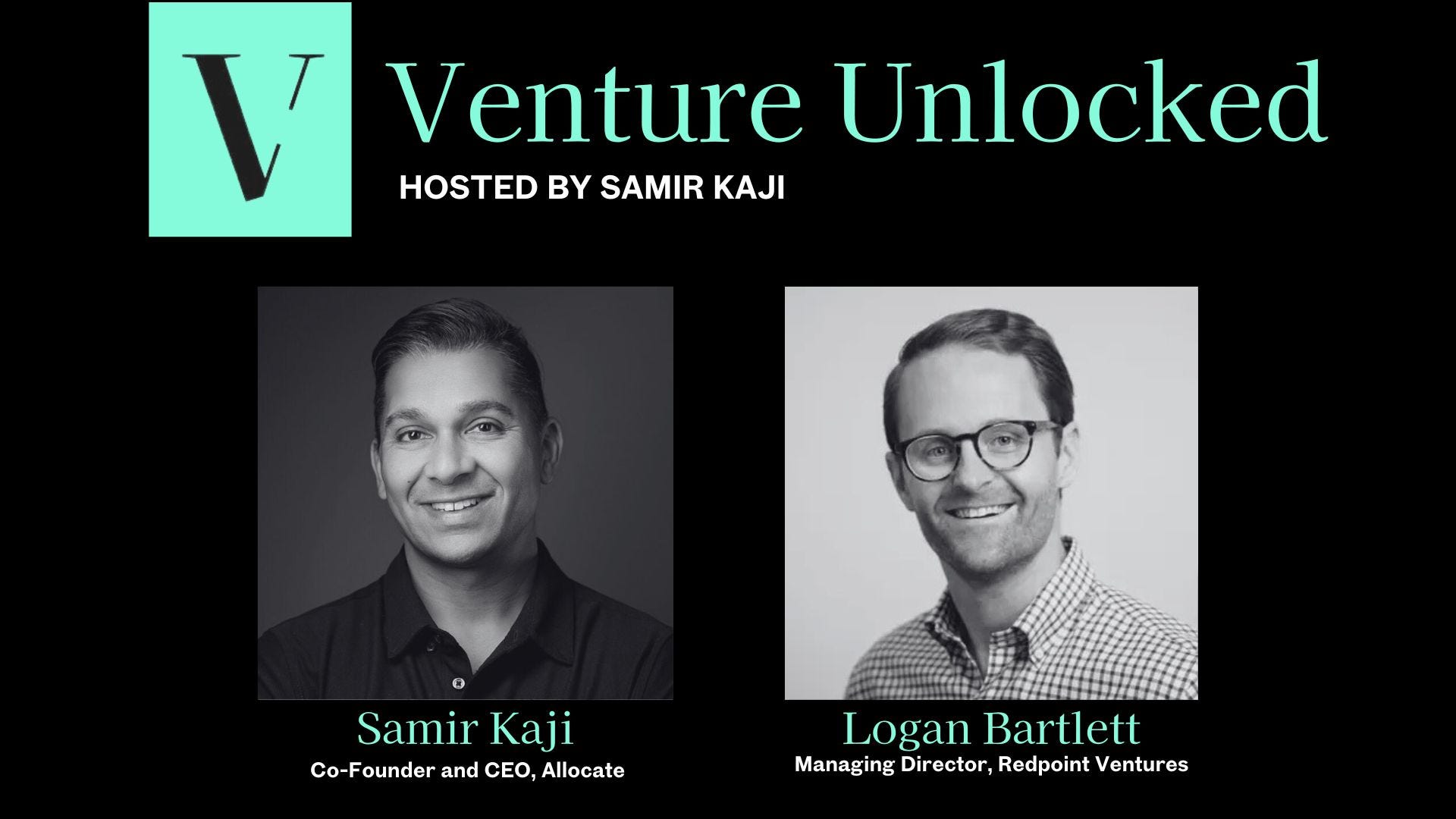
Navigating growth stage investing in today's AI driven market with Logan Bartlett of Redpoint
Follow me @samirkaji for my thoughts on the venture market, with a focus on the continued evolution of the VC landscape.
In this episode, I sat down with Logan Bartlett, Managing Director of Redpoint Ventures. We explore the evolving landscape of venture capital and startup investing and dive deep into the challenges facing unicorn companies post-2021, the transformative potential of AI, and the critical factors for successful startup investments. Logan shares insights on identifying promising founders, navigating market uncertainties, and the importance of adaptability in both founding teams and venture capital. Key takeaways include the need for founders with rapid learning capabilities, the potential disruption and opportunities in AI, the changing dynamics of startup valuations and exits in a challenging market environment, and so much more.
About Logan Bartlett
Logan Bartlett is a Managing Director at Redpoint Ventures, where he leads early-growth investments in enterprise software, with a focus on infrastructure, SaaS, and AI. Since joining Redpoint in 2020 after six years at Battery Ventures, Bartlett has backed high-growth companies such as Ramp, Cribl, Cyera, Monte Carlo, FloQast, Crossbeam, and Workato. His work has earned him recognition on both the Forbes 30 Under 30 and the Midas Brink lists.
Beyond investing, Bartlett hosts The Logan Bartlett Show, a podcast featuring in-depth conversations with top founders, operators, and investors. The show offers insights into startup growth, market cycles, and venture capital strategies, and has become a respected resource within the tech ecosystem.
Redpoint Ventures, founded in 1999, is a venture capital firm that partners with visionary founders to create and redefine markets. The firm invests in startups across various stages, from seed to growth, and has backed over 578 companies, including industry giants like Snowflake, Looker, Kustomer, Twilio, and Netflix. With 181 IPOs and M&A exits and managing $7.2 billion across multiple funds, Redpoint's expertise in guiding businesses toward success is well-established.
Timestamps:
In this episode, we discuss:
* Logan Bartlett’s Path into Venture Capital (1:46)
* The 2021 Unicorn Logjam and Future Outlook (4:38)
* AI’s Role in Reshaping Legacy Companies (8:32)
* Liquidity Challenges and Growth Stage Investing (11:16)
* Portfolio Construction and Risk Balance (17:16)
* Underwriting Series B Investments (22:41)
* Portfolio Composition and Risk Appetite (26:36)
* Evaluating AI Companies and Revenue Durability (30:01)
* Forecasting and Macro Underwriting (35:32)
* Key Investment Decision Criteria (40:11)
* Traits of Successful Venture Investors (45:28)
* Final Thoughts and Takeaways (49:58)
I’d love to know what you took away from this conversation with Logan. Follow me @SamirKaji and give me your insights and questions with the hashtag #ventureunlocked. If you’d like to be considered as a guest or have someone you’d like to hear from (GP or LP), drop me a direct message on X.
This is a public episode. If you would like to discuss this with other subscribers or get access to bonus episodes, visit ventureunlocked.substack.com
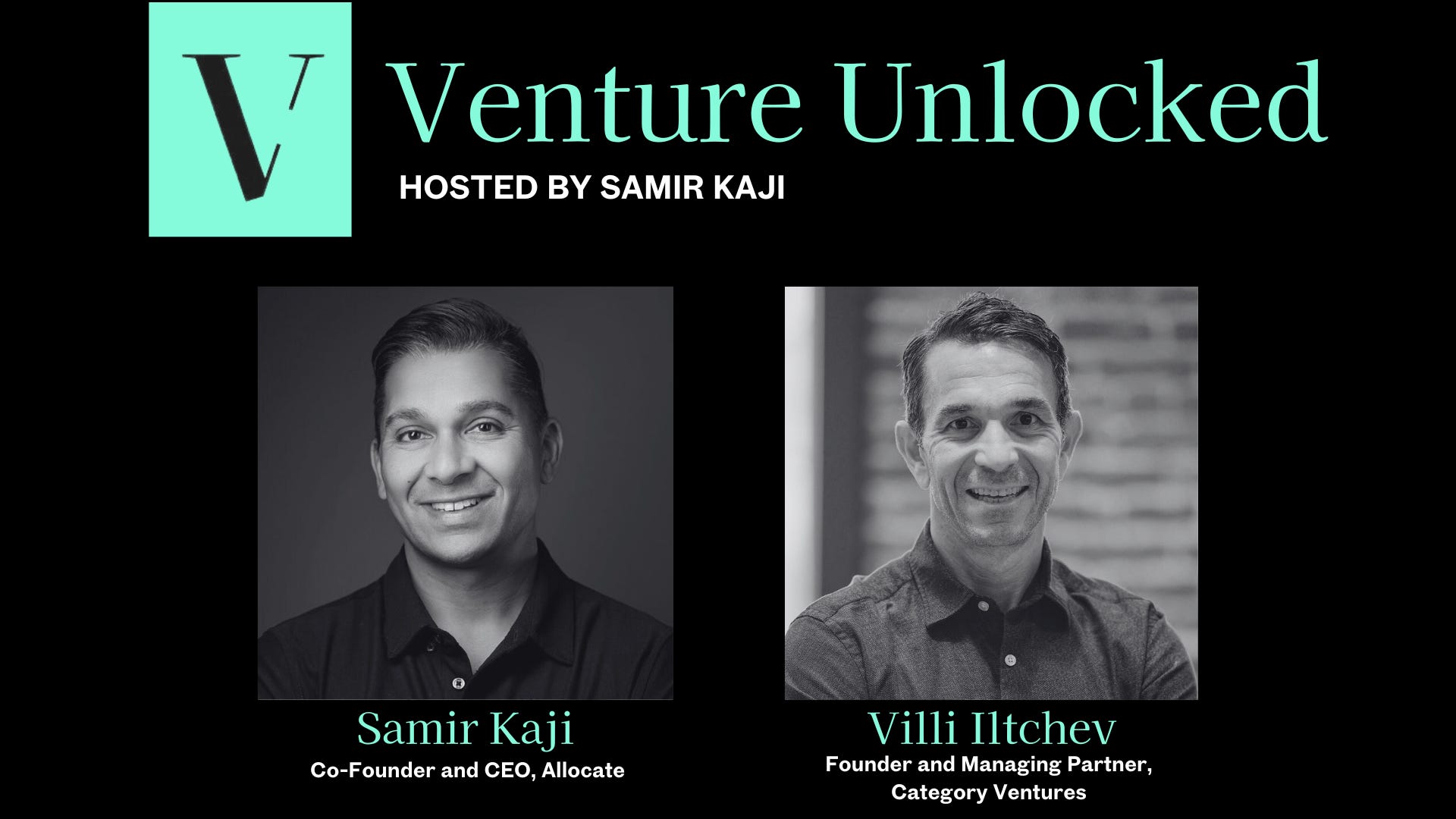
The New World of VC and Building a Durable Firm with Category Ventures' Villi Iltchev
Follow me @samirkaji for my thoughts on the venture market, with a focus on the continued evolution of the VC landscape.
Welcome to another episode of Venture Unlocked. In this episode, I had the pleasure of welcoming Villi Iltchev, founder and managing partner of Category Ventures. Villi has had a long history in tech, both in operating roles at companies like Box and Lifelock, as well as investing roles at August Capital and Two Sigma, where he departed in 2024 to launch Category Ventures.
We covered a lot of ground in our conversation, including his inspiration for starting a new firm and the experiences that informed his true north. We also spoke about the fragmentation of the market and what it means to win in early-stage investing in a heavily crowded market of dedicated seed funds & larger funds who are active in see and Series A. I really enjoyed the authenticity of the conversation and hope you do as well.
About Villi Iltchev
Villi Iltchev is the Founder and Managing Partner of Category Ventures, an early-stage venture firm focused on backing category-defining enterprise software companies. With over two decades of experience as both an operator and investor, Villi has held leadership roles at Box, LifeLock, and Salesforce, where he led investments and acquisitions in companies like HubSpot, MuleSoft, Gusto, and Zapier. As a General Partner at August Capital and later at Two Sigma Ventures, he backed standout startups like GitLab—turning a $20M investment into over $900M in returns. Originally from Bulgaria, Villi brings a global perspective and a founder-first mindset to every partnership.
Category Ventures is an early-stage venture firm founded in 2024 by veteran investor Villi Iltchev, focused on backing category-defining enterprise software startups. With a $160M debut fund, the firm invests in pre-seed and seed-stage companies across infrastructure, dev tools, AI, and applications. Drawing on Iltchev’s track record—including early investments in GitLab, Zapier, and Gusto—Category Ventures brings deep technical and go-to-market expertise to help founders build enduring businesses. Their approach centers on hands-on support and founder-first partnership to shape the future of enterprise software.
In this episode, we discuss:
* Villi’s Background and Journey (1:50)
* Lessons from Venture Capital Firms (5:35)
* Market Fragmentation in Venture Capital (8:47)
* Flexible Investment Strategy (12:24)
* Challenges with Traditional VC Models (13:26)
* Product Market Fit and Founder Support (17:35)
* Counterpoints on Large VC Firms (21:40)
* Winning in Venture Capital (24:07)
* Kindness and Community (26:24)
* Components of Success (30:00)
* Decision-Making Process (33:21)
* Intellectual Honesty in Investments (36:16)
* The Role of Fresh Perspectives (40:08)
* Acting on Great Ideas and Final Thoughts (42:27)
I’d love to know what you took away from this conversation with Villi. Follow me @SamirKaji and give me your insights and questions with the hashtag #ventureunlocked. If you’d like to be considered as a guest or have someone you’d like to hear from (GP or LP), drop me a direct message on X.
This is a public episode. If you would like to discuss this with other subscribers or get access to bonus episodes, visit ventureunlocked.substack.com
Bio of Venture Unlocked: The playbook for venture capital managers
Venture Unlocked, the playbook for venture capital managers. Hosted by Samir Kaji, this podcast is your go-to resource for starting, operating, and scaling a successful venture capital firm. With over 20 years of experience assisting and advising startups and venture firms, Samir brings valuable insights and guidance to help you navigate the world of venture capital.
Gone are the days when the venture capital community was a monolithic asset category. In today's innovation economy, new forms of capital providers have emerged, driving the evolution of the industry. Venture Unlocked is here to equip emerging managers and aspiring investors with the knowledge and tools they need to make smart, diverse, and informed capital decisions for entrepreneurs.
Through the Venture Unlocked newsletter and podcast, you'll gain access to valuable information, industry trends, and expert advice. Samir and his guests will share their experiences, best practices, and strategies for success in venture capital.
Similar Podcasts
Financially Naked gives people a weekly dose of personal finance stories.
"Leadership Re-Imagined" podcast is hosted by Dr. Jane Lovas.
No Such Thing: Education in the Digital Age is a thought-provoking podcast hosted by Marc Lesser.
"Change Happens," the podcast is hosted by Jenelle McMaster.




